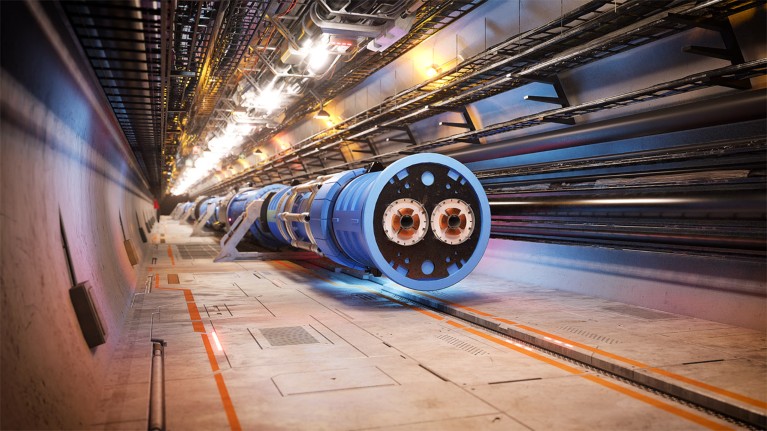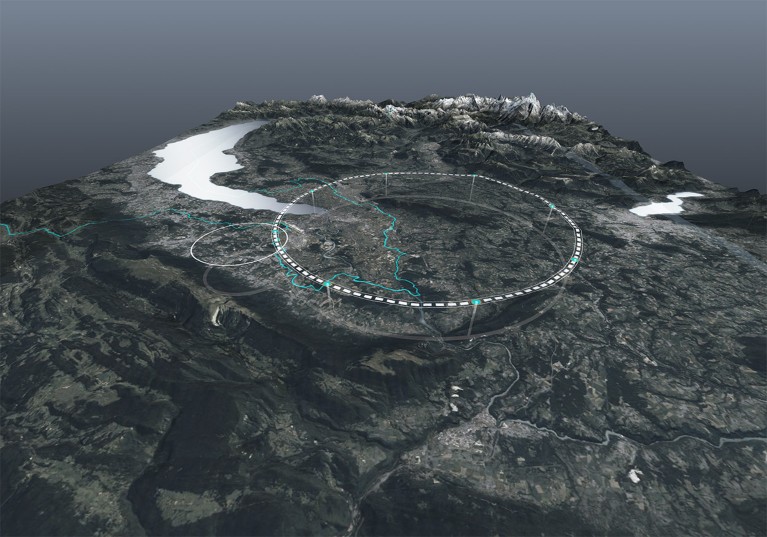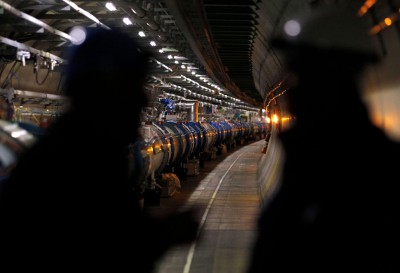

The Future Circular Collider would occupy a 91-kilometre tunnel (artist’s impression).Credit: PIXELRISE/CERN
Plans for a 91-kilometre European particle accelerator are facing a serious challenge after the German government said that the project was unaffordable.
CERN, the European particle-physics laboratory outside Geneva, Switzerland, has embarked on a detailed feasibility study for the first stage of its Future Circular Collider (FCC). This stage, known as FCC-ee, would involve a machine to smash electrons together with antielectrons, and could cost some 15 billion Swiss francs (US$17 billion) by the time it is completed in the mid-2040s. The initial phase of that study, focusing on the technical aspects, had a positive outcome, CERN said in February.
But Germany, which already contributes €267 million (US$290 million) annually to CERN — some 20% of the lab’s budget — cannot afford to spend more, said Eckart Lilienthal of the country’s Federal Ministry of Education and Research (BMBF) on 23 May, at a workshop for particle physicists in Bonn, Germany.
CERN’s supercollider plan: $17-billion ‘Higgs factory’ would dwarf LHC
The preliminary cost estimates for the FCC-ee “are subject to a large number of uncertainties, the effects of which are still largely unknown”, a BMBF spokesperson told Nature. “The financing plan is extremely vague and requires a high level of commitment from external partners, which is neither assured nor even in prospect at the present time. Given these conditions, Germany cannot support funding of the project at this point.”
The German government had already made its position known to CERN at a closed meeting in February. But Lilienthal’s announcement came as a surprise to some researchers, says Jenny List, a particle physicist at the German Electron Synchrotron (DESY) in Hamburg, who presented possible alternatives to the FCC-ee at the Bonn workshop. “Clearly, this is still sinking in with the German particle-physics community,” she says.
CERN’s research director Joachim Mnich played down the implications of Lilienthal’s remarks. “The questions and concerns he raised about the FCC are not new to us and they are all being addressed in the FCC feasibility study,” he says. The next phase of the study will consider funding scenarios.
“All comments and feedback received from our member states will be taken into account in the preparation for the final report,“ says CERN spokesperson Arnaud Marsollier.
Future Higgs factory
The main goal of the FCC-ee would be to mass-produce the Higgs boson, the particle that was discovered in 2012 at CERN’s Large Hadron Collider (LHC). Although the LHC, a 27-km circular machine that straddles the Swiss–French border, is currently the world’s largest particle accelerator, it does not have the capability to answer some of the biggest questions related to the Higgs, researchers say. For example, the particle could be a gateway to solving the mystery of dark matter, or to understanding cosmic inflation, a brief period when the primordial Universe is thought to have expanded at an exponential rate. “There is general agreement in the community that the next large machine should be a Higgs factory, and CERN is the only lab in the world currently willing to put money on the table toward this goal,” says Michael Peskin, a theoretical physics at the SLAC National Accelerator Laboratory in Menlo Park, California.
But some researchers argue that a circular collider is not the only option for a Higgs factory, and that a linear collider could have some advantages — including lower energy consumption and possibly lower construction and running costs.

The FCC (large circle, dashed outline) would be built close to its predecessor at CERN, the Large Hadron Collider (small circle).Credit: CERN
When presenting the interim report on the feasibility study in February, CERN director-general Fabiola Gianotti told reporters that CERN’s budget would pay for “a large part” of the cost of building the FCC-ee. “The cost of an FCC would be spread over many years, so clearly the main funding would be from the existing CERN budget,” says Marsollier. “Certainly we have to look at other potential sources of funding, and we do.” But others point out that the lab’s annual budget of 1.4 billion Swiss francs already has to cover the ongoing operations of the LHC, as well as an upgraded version of it due to fire up later this decade.
Several researchers told Nature that to bridge the gap, CERN is hoping to obtain billions in special funding from its host countries, France and Switzerland. The lab is also said to be pushing to expedite final approval of the FCC-ee plan because China could decide to build its own circular collider with similar capabilities. CERN has brought forward the deadline for its next strategy review by two years. This means that some work that was supposed to feed into that study will have to be come to a premature end, Peskin adds, “before any substantial simulation work on new questions can be done”. CERN did not respond to inquiries on this point by press time.
Awkward situation
“Now that the inputs for the strategy are to be submitted by March 2025, we will certainly not have a full picture of all the options for future high-energy facilities,” says Halina Abramowicz, a physicist at Tel Aviv University in Israel who led the previous prioritization strategy review on CERN’s behalf. “The early call sounds very much like a push towards FCC,” she says — an effort that “would saturate the community till the end of this century”. “The German stand pours cold water on that plan — and rightly so.”
Particle physicists want to build the world’s first muon collider
The BMBF’s very public warnings “will create an embarrassing situation for the other funding agencies” that support CERN, says particle physicist Donatella Lucchesi at the University of Padua in Italy. Lucchesi is among the researchers who say CERN has underinvested in research into technologies that could make future colliders more affordable. “The question for them will be: what are you going to do now?”
Together, France, Germany and the United Kingdom contribute around half of CERN’s budget. A spokesperson for the UK Science and Technology Facilities Council said: “The position of the UK community will next be discussed as part of the national preparations for the European Strategy for Particle Physics update.” The French research funding agency declined to comment for this story.
List says that Lilienthal “made it strongly clear that the particle-physics community should also look into alternatives, not only think about the FCC” in his talk, while stressing that the future of CERN will remain of the “highest priority” to BMBF.
Source link








